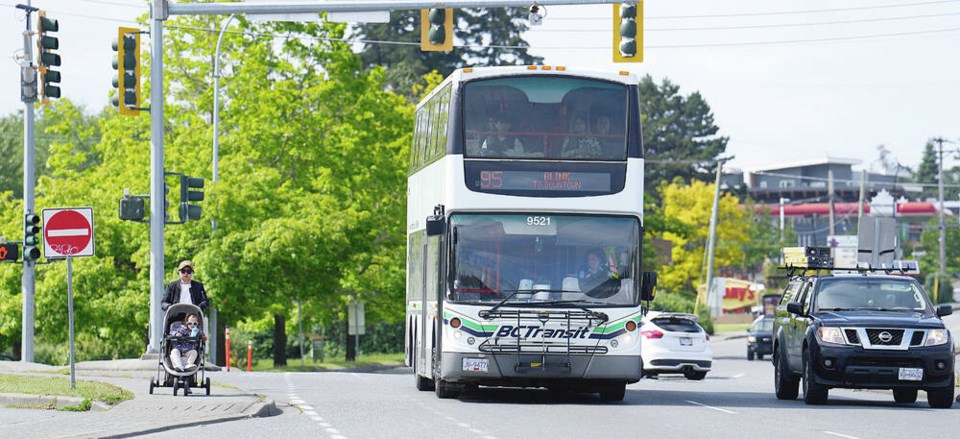Transit users in Greater Victoria are being warned to expect service reductions after B.C. Transit removed 34 buses from service because of a Transport Canada safety recall.
On Monday, at least 18 routes saw run cancellations — 34 on the Blink 95 rapid bus line alone.
The service reductions are expected to continue until June 21.
University of Victoria Students’ Society spokesperson Isabelle Easton said some of her co-workers were late to work as a result of the reduced service. “People on campus are feeling the disruption.”
Easton said she understands the recalls are necessary to keep transit users safe, but earlier and clearer notices would be helpful.
It was difficult to find information about the disruption on the Umo transit payment app, she said. “That could be a user problem. But if I couldn’t find it, it probably meant that a lot of other members of our community couldn’t find it.”
Transport Canada issued a recall for 12 models of Vicinity Motor Corp. compressed natural gas buses from model years 2017 to 2022.
The recall is for low-pressure CNG hoses that “may not meet the requirements of Canadian regulations,” it said. “As a result, natural gas could leak from the hoses.” There is a safety risk, as natural gas leaks could result in fires or explosions, it said.
Vicinity Motor Corp. will notify owners and provide instructions on how to inspect and replace the hoses if necessary, the federal transport regulation agency said.
B.C. Transit spokesperson Jamie Weiss said replacement parts are expected to arrive in the coming week and buses will return to service as soon as possible.
“B.C. Transit will work to ensure service impacts are minimized, and that no one route is impacted more than another,” he said in a statement. “We will continue to inform customers of any necessary trip cancellations as soon as possible once they are known.”
The 34 buses pulled from service represent about 11 per cent of the fleet in the Victoria Regional Transit System, he said.
Weiss said B.C. Transit was able to deliver 96 per cent of Monday’s scheduled service with an active fleet of 215 buses. “We know any trip cancellations are too many as people just want their bus to be there when it is scheduled,” he said.
Unifor Local 333 B.C. president Stephen Bains, who represents Greater Victoria transit workers, said the affected buses were removed from service on Saturday.
A total of 39 Greater Victoria buses are involved in the recall but five were repaired in the past week, and there have been no reported natural gas leaks on any of the buses, he said.
B.C. Transit’s Vicinity CNG buses were mostly acquired around 2021 and the union has long had concerns about them, Bains said. “There always seems to be something that we’re having to repair on these buses. They’re non-union-made buses, and they’re not really manufactured in Canada, just assembled in the final stages in Canada.”
Some Vicinity buses are experiencing “rotting floors,” a problem that is being addressed, he said.
The union’s concern is that B.C. Transit doesn’t cut corners to repair other buses that aren’t affected by the recall, he said. “We hope that B.C. Transit continues to prioritize safety over service.”
Liz Cronin, a member of the Victoria Transit Riders Union, a transit advocacy group, said B.C. Transit shouldn’t have to choose between reliability and safety. “I know as a social worker that essential services like transit need to be run well and need to be excellent to create a healthy society.”
Vicinity was formerly known as Grande West Transportation International Ltd. The Aldergrove-based company, which did not respond to a request for comment Monday, said on its website that it has sold more than 1,000 transit buses since 2008.
Vicinity CNG buses were also subject to a recall in February over possible rubbing of compressed natural gas tanks against other parts of the vehicle. A notice issued by Transport Canada said the rubbing could result in tank ruptures that could cause explosions and fire.
To look up changes to bus schedules, riders can check the B.C. Transit website, alerts.bctransit.com, the Transit app or the Umo app.
On Wednesday, bus rides in Greater Victoria will be free to mark Clean Air Day.
>>> To comment on this article, write a letter to the editor: [email protected]



